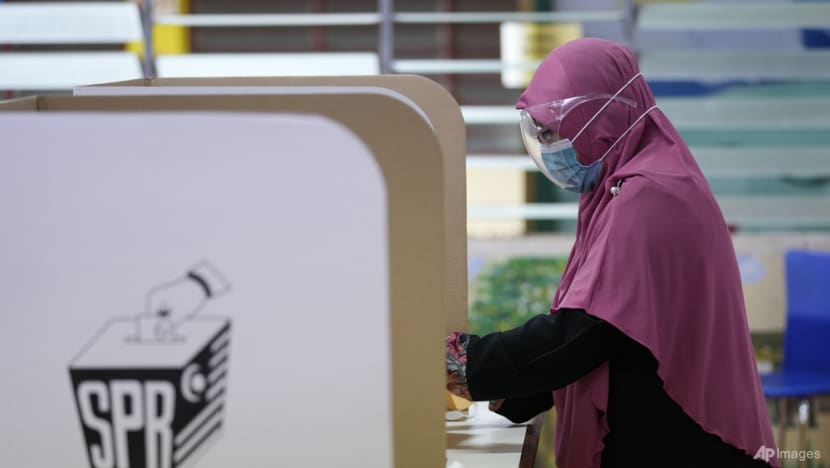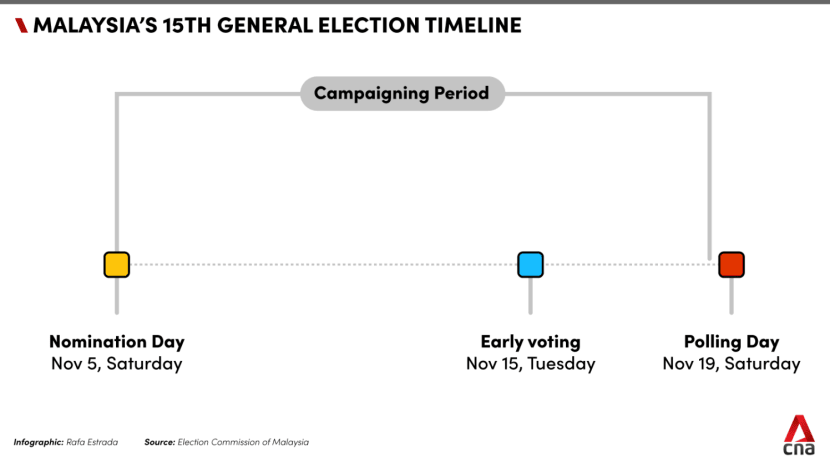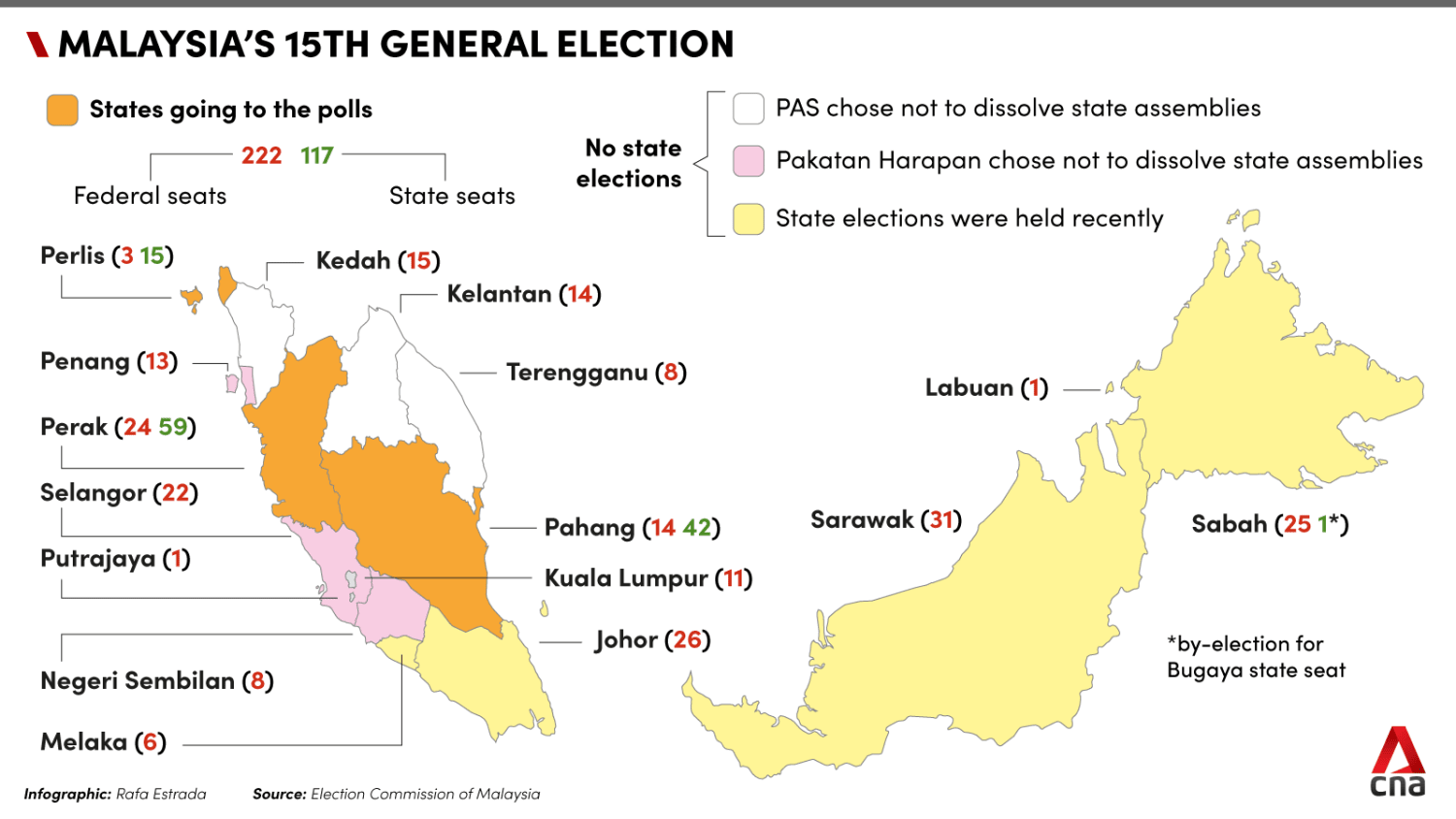Malaysia to go to the polls on Nov 19 amid worries over monsoon season
Nomination day will be on Nov 5, while early voting will take place on Nov 15.

PUTRAJAYA: Malaysia will hold its 15th General Election (GE15) on Nov 19, said the Election Commission (EC) on Thursday (Oct 20).
Nomination Day will be on Nov 5, while early voting is set to be held on Nov 15, said EC chairman Abdul Ghani Salleh.
"The campaigning period has been set for 14 days, from the date of nomination to 11.59pm on Nov 18," he said during a press conference.
He added that a by-election for the Bugaya state seat in Sabah will also be held during the same period.
Mr Abdul Ghani also said that the elections are expected to cost RM1.01 billion (US$213 million). More than 21 million people will be eligible to cast their votes during the elections.
Applications for overseas postal voters will close on Oct 23, he said.

On Oct 10, caretaker prime minister Ismail Sabri Yaakob announced that parliament has been dissolved, paving the way for national elections to be held before the end of the year.
The states of Perak, Perlis and Pahang have also dissolved their legislatures and state polls will be held concurrently with the national elections.
Six other states – three under the Pakatan Harapan (PH) coalition and the other three led by Parti Islam Se-Malaysia (PAS) – decided not to dissolve their assemblies for now.
The three states under PH are Selangor, Negeri Sembilan and Penang while the states under PAS rule are Kelantan, Terengganu and Kedah.
PAS is a member of the Perikatan Nasional (PN) coalition together with Parti Pribumi Bersatu Malaysia (Bersatu), among others.
The state assemblies of Sabah, Sarawak, Johor and Melaka are out of the equation as polls were held recently.

An election had not been due until September 2023, but Mr Ismail Sabri had been under pressure from some factions of his ruling coalition to hold the vote earlier.
On Sep 30, the United Malays National Organisation (UMNO) supreme council decided that parliament must be dissolved soon so that GE15 can be held this year.
UMNO president Ahmad Zahid Hamidi, who is facing 47 charges of criminal breach of trust, corruption and money laundering, had been very vocal in pushing for snap polls, ostensibly to seek a fresh mandate from the people.
UMNO’s call for an early GE15 has been criticised by the opposition and Mr Ismail Sabri’s own Cabinet members as Malaysia’s Meteorological Department has warned of floods during the north-east monsoon season, which typically starts in November and ends in March.
Following the dissolution of parliament, Malaysia’s King Al-Sultan Abdullah Ri'ayatuddin Al-Mustafa Billah Shah said he had no choice but to consent to the dissolution of the parliament.
In a statement on Oct 10, Comptroller of the Royal Household of Istana Negara, Ahmad Fadil Shamsuddin, said that the ruler was disappointed with the current political developments in the country.
There are 222 seats in the Lower House.
In GE14, PH won 113 seats. At that time, its component parties were Parti Keadilan Rakyat, Democratic Action Party, Parti Amanah Negara and Bersatu.
Barisan Nasional won 79 seats while PAS won 18 seats. Twelve seats were won by other parties and independent candidates.
The PH administration lasted for 22 months before it fell apart due to infighting.
MORE PLAYERS
While GE14 was standard for Malaysian politics with two coalitions vying for dominance, the upcoming general election will be different with more players, said Professor Wong Chin Huat, a political scientist from Sunway University in Kuala Lumpur.
“This round we have three national coalitions and three regional blocks in Sabah and Sarawak trying to play kingmaker,” Prof Wong said on CNA’s Asia Now.
He added that there will likely not be a simple majority government, but instead a hung parliament followed by coalition negotiations to form the new government.
Prof Wong said that while some voters may feel “disorientated” facing more candidate choices and multi-cornered fights, they no longer have to deal with the political volatility of lawmakers switching sides after getting voted in.
The common occurrence over the past few years would now be reduced with the recent introduction of a new anti-party hopping law.
“Some voters will also be assured that their votes matter. Because of the 2018 results, we are now having the ex-prime minister Najib Razak in jail for his 1MDB scandal,” said Prof Wong.
The ruling Barisan Nasional coalition would likely aim to convince people to vote for them for the sake of stability and continuity, said Prof Wong.
However, it remains a big challenge for them to gain a simple majority, with the occurrence of floods a key factor on their chances.
“If we have very few floods, then Barisan Nasional stands to gain. But if you have a lot of constituencies flooded during or before polling day, then voters may punish them, especially if elections need to be postponed,” said Prof Wong.
Opposition parties are expected to focus their campaigns on the economy, with a risk of recession and other difficulties looming next year.
But their appeal on that front may be weak as they have not yet presented voters with clear policies to convince them that they would do better than the incumbent government, said Prof Wong.
He also identified Kelantan, Terengganu and Sabah, as key battlegrounds in the coming electoral contest.

















